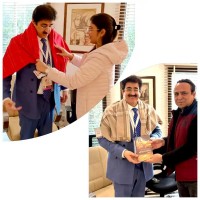- India at Work 2024 Report by Apna.co reveals over 7 crore job applications, 12 lakhs jobs posted in 2024
- Geetanjali International Foundation Celebrates the 5th Edition of Sant Shiromani Surdas Mahotsav
- Euro Energy Resources Limited Announces New Medical Battery Solutions in Leicester
- Matrimony.com announcing the launch of a new specialised service, Make My Wedding
- Hyatt Jaipur Malviya Nagar Rings in 2024 with Dazzling Disco Night
- Relaxo Launches 'Festive Fiesta Offer' with Big Savings on Footwear Across Brands
- Style Condoms Unveils New Identity with #StyleHarBaar Campaign and Three New Condoms
- Softflix IT Solutions Celebrates 3rd Anniversary
- Lay’s Brings Its Iconic Flavours to Delhi’s Streets with an Exciting Food Truck Experience
- Sandeep Marwah Honored by Namo Gange at the 17th GFFN for Promoting Love, Peace, and Unity
- AAFT School of Hospitality and Tourism Showcases Moroccan Cuisine at 17th Global Film Festival
- The Leela Hyderabad Celebrates Christmas with Exquisite Dining Experiences
- Premium electric vehicles and serial hybrids EXLANTIX will be presented at AVTODOM Varshavka
- Novotel Hyderabad Airport to host an extravagant Christmas Feast
- Revolutionizing Door Scheduling: RapidSpec Launches Advanced Software for Manufacturers
 Mail to a Friend Mail to a Friend |
|
     |
University of Chicago Urban Labs and the Delhi government has announced the finalists in the Urban Labs Innovation Challenge
One, or more, of the sevaen finalists will receive up to Rs. 2 croreto pilot their ideas.
October 17, 2016 New Delhi, India ? The University of Chicago Urban Labs and the Delhi government has announced the finalists in the Urban Labs Innovation Challenge: Delhi, an effort to improve air and water quality in one of the world?s most polluted cities. The finalists from the crowd sourcing competition are each competing to win up to Rs. 2 crore to work with the Urban Labs? Energy & Environment Lab, the Energy Policy Institute at the University of Chicago?s India Office (EPIC-India), and the Delhi government to pilot and test their idea. If the results are promising, the selected program could become a model for other cities in India and beyond.
The winners will be announced at an event on October 21st. The seven finalists were selected among nearly 250 ideas from students, researchers, entrepreneurs, non-profit and for-profit organizations and citizens from across India and around the world who submitted ideas for the challenge, which launched last December.
The Challenge is a project of the Tata Centre for Development and is supported by Tata Trusts.
Ashish Khetan, Vice Chairman of the Delhi Dialogue and Development Commission said, ?All of the seven finalists have shown a deep passion and commitment to help solve Delhi?s environmental problems. Any one of these innovative ideas could transform our city. We look forward to working with the eventual winner or winners and the University of Chicago to make Delhi a clean and prosperous city.?
?Because of the scope and diversity of all of the ideas we have received for the Delhi Challenge, selecting these seven was extraordinarily challenging,? said Michael Greenstone, director of the University of Chicago Urban Lab?s Energy & Environment Lab and EPIC-India.?But we are confident that these ideas have high potential for improving Delhi?s environment and the lives of its citizens.?
The finalists include:
? Chakr Innovation Pvt. Ltd: Removal of Particulate Matter from the Exhaust of Internal Combustion Engines and Subsequent Processing to Convert it into Ink and Paints.
Particulate matter pollution is known to cause strokes, asthma and even cancer. Vehicle exhaust, including diesel generators, contributes up to 34 percent of Delhi?s particulate pollution. This project would employ a device which when coupled with the exhaust pipe of diesel engines absorbs over 72 percent of the particulate matter?all without negative effects on engine performance. The technology can then convert this captured particulate matter into black ink and paints which can be sold to literally ?Print from Pollution?. The project would pilot the technology initially on diesel generators used as power back-ups for mobile telephone towers in Delhi, which are off the grid and consume over 50 litres of diesel each day to run. There are over 14,000 mobile towers in Delhi and most of them have a diesel generator installed either as the primary source of power or as power back-up in case of load shedding. From there, the project will use the technology for larger diesel generators used at big hospitals and hotels, followed commercial vehicles.
? Chintan Environmental Research and Action Group: Addressing Air Pollution By Reducing Burning of Waste by Delhi?s Security Guards to Keep Warm
The burning of municipal solid waste contributes to about 10 percent of particulate matter pollution during Delhi?s winters. This project would tackle waste burning by addressing the challenge of waste burning by security guards during winter nights. Delhi?s air could be poisoned by at least 30,000 small fires every night from November to February, also the peak air pollution months, by security guards to keep warm. Even the best waste management systems cannot address this, hence it requires a focused intervention to yield impactful results. The long-term goal of the project is to eliminate air pollution where it is caused by burning of waste locally by combining behavior change and low-cost technical and engineered innovations at the mohalla level. Chintan will influence behavior change amongst residents, security guards and security agencies as well as test tangible technical solutions with 50 guards, gleaned via an open, public competition for improved clothing and kiosks. Enabling security guards to remain warmer, along with education about the impact of burning waste on their own health, will prevent them from burning waste by as much as 60 percent.
? Climate Foundation: ?Charvesting? to Eliminate Rice Field Burning in Haryana and Punjab to Reduce Air and Water Pollution in Delhi
Most farmers in Punjab and Haryana burn rice straw after harvesting is over to prepare fields quickly for the next season?s crops. Burning from the two states comprises 48 percent of total emissions from rice straw burning across India. During the months rice straw is burned, Delhi experiences a much higher air pollution, with PM2.5 levels commonly exceeding 400 ppm. Governments in Punjab and Haryana have acknowledged the importance of the issue. Straw burning is actually illegal, but inexpensive, and thus widely practiced. ?Charvesters? affordably recycle rice straw into biochar with clean emissions using the Biochar Reactors developed by the Climate Foundation. ?Charvesting? allows farmers to comply with existing air pollution laws at minimal cost and effort, increase soil productivity and restore depleted lands. Several villages in Haryana support this project and have agreed to change the practice of open rice? straw burning and pilot the proposed ?Charvesting? system. This approach will ultimately lead to a significant reduction in air and water pollution in Northern India including Delhi, provide a cost ?effective, reliable, sustainable and decentralized approach to address local needs, increase crop growth, improve farmer productivity, sequester carbon in soils, and provide a valuable income source for rural villages.
? Mahila Housing SEWA Trust: Transforming Home Ambience for Slum Dwellers in Delhi
Access to light, ventilation, and efficient energy is critical to improving the quality of life and productivity of the poor, especially women who spend the majority of their time indoors. Unfortunately, these women only have illegal and irregular access to electricity. Poor light and ventilation make them depend more on electrical lighting and cooling devices, and the dwellings are often constructed with materials that absorb heat and require more energy to cool down. Slum communities often use cooling fans for hours a day, raising their energy bills by over 3000 INR per month especially during summers. This project will pilot modular roofs in three slums of Delhi to reduce home temperatures and improve ventilation. It will also mobilize communities to generate awareness on the benefits of using the product by training women entrepreneurs and design a loan product to create a sustainable business model. The improved indoor environment will help reduce exposure to extreme heat. The reduction in household energy costs will allow poor households to increase spending on food, health, and education, resulting in improvements in the quality of life. And the low energy, better designed homes will make the households less vulnerable to weather impacts, improve their resilience against climate change risks.
? The Energy and Resources Institute (TERI): Promoting Water Conservation in Restaurants: Blue Star Rating
Water is under a constant stress, with growing demand from all sectors including restaurants. Much of this stress is caused because of water wastage or inefficient use. In 2015, Delhi Jal Board has fined over 850 people including owners of hotels, restaurants, and commercial complexes for misuse of water and illegal water and sewer connections. This project would initiate the process of efficient water management in this sector by encouraging restaurants to take simple steps like plugging leaks, serving customers with half a glass of water and raising awareness of various key stakeholders on the importance of water conservation. The restaurants would be awarded with a blue star for their efforts, which would inspire other restaurants and others to follow suit. In the long-run, this project would promote water conservation in all sectors across the city and establish rating system of water use.
? Capacloud Trading Solutions Pvt. Ltd: Outdoor Air Pollution Control by Using Non-Conventional Vertical Gardens
Bhalswa Jahangir Pur Slums in Delhi are home to the poorest of the poor, who are the worst victims of swelling air pollution in the city. Apart from inhaling the routine automobile exhaust, the slum dwellers are exposed to a highly toxic air due to burning of solid waste and wooden feedstock used in cooking stoves. The prolonged exposure to such unhygienic conditions has been shown to retard the physical and mental growth of residents, especially children. This project would provide the Bhalswa Jahangir Pur slum dwellers cleaner air through a techno-societal intervention comprised of two pillars: A vertical garden/green wall that substantially absorbs the major air pollutants through an avant-garde hydroponic media embedded with selective smart adsorbents, and community ownership to slum dwellers for operation and maintenance of the commons. The project would reduce pollutants by as much as 30 percent in the immediate area of the slums.
? Reap Benefit Eco Solutions Pvt Ltd: U Governance App (For Citizen Problem Solving)
Making a city livable is not the government?s responsibility alone. This project puts some of the power in the hands of citizens through the ?U-Governance? app. The App aims to assist citizens in solving local environment and civic issues, in concert with their local municipality, starting with a focus on water and sanitation. The app will make accessible local data and information on appropriate government bodies, a database of customizable solutions, and community engagement and mutual learning between citizens and the government. The goal of the app is to empower citizens to bring about a transformation through a combination of report features, solutions and rich local data generated through the app. It will solve local issues along with the government through local data & local solutions.
###
U.Chicago Urban Labs
The University of Chicago Urban Labs was founded to help address the fundamental challenges faced by cities across the world across five domains: crime, education, energy & environment, health, and poverty. Urban Labs partners with civic and community leaders to unlock the power of science and improve lives. Urban Labs? evidence-based approach gives policymakers and practitioners the knowledge they need to effectively and cost-efficiently improve urban life. Learn more about Urban Labs at urbanlabs.uchicago.edu
Energy Policy Institute at the University of Chicago, India (EPIC-India)
The Energy Policy Institute at the University Of Chicago (EPIC) works to address the global energy challenge that aims to ensure energy markets provide access to reliable, affordable energy, while limiting environmental and social damage. We do this using a unique interdisciplinary approach that translates robust, data-driven research into real-world impacts through strategic outreach and training for the next generation of global energy leaders. A hub of our efforts centers in India, where we maintain a strong research portfolio and deep network of collaborations. EPIC-India is based at the University of Chicago Center in Delhi. Learn more about EPIC-India: epic.uchicago.in
Tata Center for Development
In partnership with Tata Trusts, the Tata Centre for Development at UChicago addresses some of India?s most pressing economic and social development challenges. The Centre, led by the University of Chicago Harris School of Public Policy in the United States and the University of Chicago Trust, a charitable trust in India, integrates evidence-based policy research, an innovative implementation platform, and proven leadership in executive education programs to tackle pressing development issues across India.
Company :-PR Pundit
User :- Deepika Girdhar
Email :-deepika.g@prpundit.com
Phone :-91 124 4229300
Mobile:- + 91 9643470449
Url :- www.tcd.uchicago.edu











